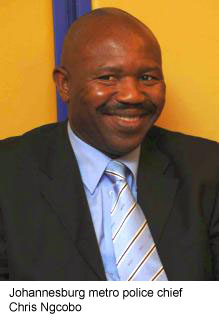
Calls have been made by the South African Municipal Workers Union (Samwu) for the resignation or redeployment of two of the country’s key metro police heads – Johannesburg’s Chris Ngcobo, and eThekwini’s Eugene Nzama – over use of public money and doubt about their leadership.
They are not the first metro police chiefs to find themselves courting controversy. Former Ekurhuleni metro police chief Robert McBride’s drunk driving case is probably the best known nationally, but questions have also been asked about his replacement, former Tshwane metro police chief Hlula Msimang, who quietly stepped into McBride’s shoes, and still holds the position.
In 2006 Msimang settled a case of assault out of court after he was accused of injuring and trying to arrest a woman without a warrant at a Tshwane shopping centre. He was seen as a controversial replacement, after the negative publicity of the McBride case and the adverse impact it had on staff morale.
In the case of eThekwini metro police chief Nzama, his staff first made headlines after being accused by Durban NGOs of removing street children ahead of the 2010 Fifa World Cup and the recent climate change conference COP17. Both charges have been denied by the police.
Then just a few days before the release in early February of the damning Manase audit report, disgruntled Samwu metro officers handed over a memorandum of demands to eThekwini mayor James Nxumalo, in which they threated mass action if, among other things, Nzama was not sacked or reassigned.
Their gripes against Nzama, a former South African National Defence Force officer, included misuse of police vehicles and questions about the appointment of some staff members.
The Manase report, which revealed R2.2-billion in irregular expenditure in eThekwini, also implicated 14 traffic officers for not only owning taxis but also owing the city outstanding fines. It also alleged that at least 30 officers bought their licences. Samwu has said the report vindicates its position regarding Nzama.
Ngcobo, the Johannesburg metro police head, has come under fire recently for both his leadership, as claimed by Samwu, and his department’s interpretation of the requirements of the Administrative Adjudication of Road Traffic Offences (Aarto) Act. The Justice Project South Africa has said the Johannesburg metro police may not send infringement notices to motorists by normal mail – these must be registered in terms of the Aarto Act.
Samwu has questioned, among other things, the wisdom of some of Ngcobo’s senior appointments, a daily traffic fine quota assigned to officers, and lack of action after reports of irregular spending.
The Tshwane metro police department has also not escaped media attention.
It is presently led by acting head Steven Ngobeni, the city's former protection services director. It was widely believed that deputy chief Ndumiso Jaca was considered for the job, but he was allegedly taken off the list after it was discovered that his BMW and Harley Davidson shared the same registration number, and there was also doubt surrounding the dates of registration of the two vehicles.
In September 2011 Wayne le Roux replaced Rob Young as Cape Town’s metro police department head. Young also came to a controversial end after he resigned in the midst of a hearing into the appointment of his stepson to the position of constable.
The metro police departments of Durban, Johannesburg, Ekurhuleni, Tshwane and Cape Town were established between 2000 and 2003 as a result of a 1998 amendment to the South African Police Service Act, which allowed municipalities to create local police services performing crime prevention and by-law and traffic enforcement within their municipal limits.
According to the Institute for Security Studies, most personnel absorbed by the metro police departments were drawn from the municipal traffic and security bodies that preceded them.
Related articles:

